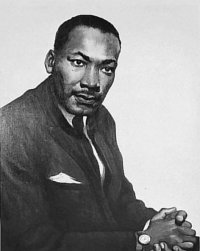|
Return to Noteworthy Fair Park Visitors The Visit of Rev. Dr. Martin Luther King, Jr.
One of these visits occurred on Friday, January 4, 1963, when local African-American activists held a poll tax rally at the Music Hall in Fair Park. King was invited to speak. Others who participated included local labor union representatives, the heads of local black churches, and representatives of the Democratic Party, among others. Texas GOP chairman Peter O'Donnell along with local Republican officials, were invited to take part, but they claimed the rally was partisan in nature and refused to participate in the event Jimmy Robinson of Garland, a member of the National States Rights Party, picketed outside the hall during King's speech. "We don't want to start a commotion," Robinson said when interviewed by the Dallas Time Herald, "We just want to let the people know that we do not believe in what the NAACP and Martin Luther King stand for." Robinson added that there were from 100 to 200 Dallas area members of the party, which was founded in Birmingham, Alabama in 1958. One of the purposes of the rally, sponsored by the Dallas County United Poll Tax Committee, was to register eligible African-American voters. Accordingly, there were poll tax deputies stationed in the lobby to accept payments. In a related story, the Dallas Times Herald reported: "A quarter of a million Dallas Countians are expected to pay their poll taxes before the deadline on the last day of January," adding that there were "indications…that the Democrats will have more poll tax deputies out working this year than the Republicans." Before the rally began, King held a news conference backstage with local news reporters. Afterward, the chairman of the Dallas County United Poll Tax Committee - Rev. H. Rhett James, introduced him to the racially mixed audience of about 2,500 people. In his remarks, King praised President John F. Kennedy, saying that in his opinion the chief executive had "done some impressive things in civil rights, especially when compared to the previous (Eisenhower) administration." As an example, he cited Kennedy's fulfillment of his pledge to issue an executive order ending discrimination in federally funded public housing, announced on November 20, 1962. However, added King: "It does not do the full job." It was, he said, "a start," but Kennedy "must give the order teeth if it is to work." King also spoke of his plan to lead a boycott of businesses that practice discrimination in hiring. In the near future, he said, they would "find themselves targets of a nationwide 'selective buying' program." (At the time of the rally, the Civil Rights Act that would finally outlaw such discriminatory practices was more than a year away from enactment.) During the rally, detectives discretely searched the auditorium for a bomb after a threatening phone call was received, but the warning turned out to be hoax. Using language similar to the famous speech that he would deliver later that same year in Washington, D.C., King said the "substance [of his dream]" was "that all men are created equal." In "a melodious voice that rose and fell with the tempo of his speech" and gesturing "with his arms and hands," he declared:
He added: "If the American dream is to be a reality, the idea of white supremacy must come to an end now and ever more." This last remark was greeted by shouts of "That's right!" from his obviously enthralled audience. The Dallas of 1963 was still a racially segregated city. Although King's leadership in the Montgomery Bus Boycott of 1956 had led to the court-ordered desegregation of city buses all over the U.S. (including Dallas), schools were still segregated (despite the 1954 Brown vs. Board of Education ruling) and many places of business still practiced discrimination in serving customers. "White Only" and "Colored Only" signs could still be seen everywhere, particularly over water fountains and on restroom doors and newspapers printed classified ads offering rental housing for "Colored Only." The 24th Amendment to the Constitution, ratified in 1964, finally did away with the poll tax. Sources:
Notice: The image of Dr. King (above) is from the Library of Congress American Memory Collection website. This website copyright © 2002-2004 by Steven Butler. All rights reserved. |
 Although he is more closely associated in the popular mind with cities such as Montgomery, Birmingham, Selma, Atlanta, and Memphis, the Rev. Dr. Martin Luther King, Jr. visited several other U.S. cities during his more than twelve-year tenure as America's foremost civil rights leader. One of these was Dallas, where, by invitation, King spoke on several occasions.
Although he is more closely associated in the popular mind with cities such as Montgomery, Birmingham, Selma, Atlanta, and Memphis, the Rev. Dr. Martin Luther King, Jr. visited several other U.S. cities during his more than twelve-year tenure as America's foremost civil rights leader. One of these was Dallas, where, by invitation, King spoke on several occasions.